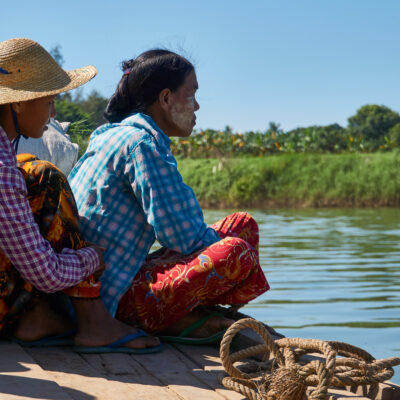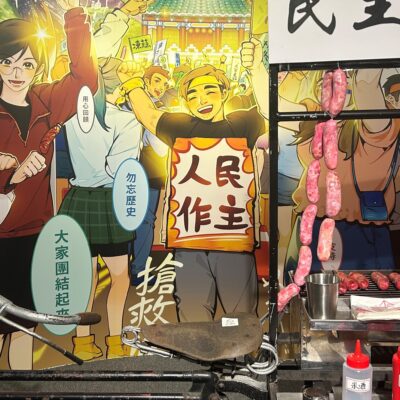Financial remittances, money sent home by migrants, are widely recognised for their economic impact in Asia. But a subtle yet impactful form of exchange is often overlooked.
Social remittances—exchanges of knowledge, values, and skills that migrants share with their home communities—hold transformative power, particularly in times of crisis when a country cannot rely on economic remittances.
In Myanmar’s case, the significance of social remittances has become more visible since the military coup in 2021.
Many Myanmar academics had begun migrating to pursue academic freedom and better opportunities abroad before the coup, but since the coup, the migration of academics has accelerated driven by fear, repression and the dismantling of the country’s education system. In exile, these scholars have continued to engage in teaching, research, and collaborative initiatives through transnational networks to create spaces of knowledge exchange, solidarity and resistance. Through these networks, Myanmar academics are engaging in the active transmission of social remittances: developing digital classrooms, mentoring young people, producing new curricula, and participating in public discourse as alternative higher education providers.
This article focuses on Spring University Myanmar (SUM)—an Interim Education Provider (IEP) founded by Myanmar students and scholars, as a case study of how social remittances can operate in practice. The sections that follow outline the theories of transnationalism and social remittances that have informed the emergence of SUM within Myanmar’s political crisis and examine how social remittances have supported resistance efforts through education and ideological resistance.
A transnational approach to migration
Migration is often imagined as a one-way journey—people leaving one country to settle permanently in another. However, this traditional view does not reflect the lived reality of many migrants who remain deeply connected to their countries of origin, especially in contemporary times. Over the past few decades, scholars have increasingly turned to transnational migration theory to capture this complexity better.
Rather than viewing migrants as simply immigrants or emigrants, transnationalism sees them as people who live and act across borders: transmigrants. Transmigrants maintain social ties, exchanging knowledge and moving ideas, money and practices between places. Sociologist Thomas Faist describes this as forming “transnational social fields”—webs of relationships where people, information, and influence flow in multiple directions. These exchanges affect not only migrants themselves, but also their families, communities, and institutions back home. This lens is especially useful for understanding Myanmar’s displaced academics who remain deeply engaged with their homeland, even living abroad.
Social remittances
Sociologist Peggy Levitt uses the term social remittances to refer to the ideas, values, skills, and other forms of social capital that migrants share with their home communities.
Social remittances can shape everything from gender norms to civic activism and political attitudes. They flow through social and personal networks between friends, families and institutions and are influenced by historical and political contexts in which migrants are embedded. These non-material exchanges can be especially powerful in conflict-affected settings where traditional education systems have been disrupted and authoritarian regimes control formal institutions. They offer not only alternative sources of knowledge but also ways to envision and build different futures despite repression.
Understanding the resistance of Myanmar’s academics through research
Social remittances remain an underexplored area in Myanmar’s context, particularly regarding the role of displaced academics and alternative education initiatives such as Spring University Myanmar (SUM). Political crises, security risks, and the challenges of accessing scholars at risk have limited the scope of empirical research on these topics. Therefore, to navigate these risks, this article draws on publicly available secondary sources—including academic publications, policy reports, official communications from SUM on its digital platforms, and media interviews with its founders.
Through these sources, I critically analyse how the 2021 military coup has impacted Myanmar’s higher education sector, and how transnational academic networks have responded through the transmission of social remittances. The article takes SUM as a case study to understand how it operates as a transnational hub for knowledge-sharing and resistance. While this approach allows for a broad, safe, and timely assessment, more nuanced insights would benefit from future research including interviews and first-hand accounts from students and academics, when circumstances allow.
Myanmar’s learning crisis after the coup
The coup triggered a severe political and humanitarian crisis when the elected National League for Democracy was ousted by the junta. This event ignited widespread resistance among millions of citizens who joined protests and other movements. Among them were students, teachers, and public servants, many of whom joined the Civil Disobedience Movement (CDM)—a nationwide campaign that rejected the military regime’s authority. In response, the military cracked down violently, killing thousands and targeting institutions that were seen as hubs of revolution.
The education system was one of the hardest-hit sectors. Universities and schools shut down as students and faculty walked away in protest. Attempts by the regime to reopen institutions were met with widespread boycotts. Campuses that once fostered learning became sites of surveillance and intimidation. The breakdown of formal education left a generation of students in limbo and created urgent questions about how learning might continue outside of junta control. Many displaced scholars began collaborating with peers still inside Myanmar, launching Interim Education Programs (IEPs)—alternative learning spaces designed to keep education alive in the face of crisis. These transnational academic networks provide a space for sharing knowledge, preserving democratic values, and offering a lifeline to students who had lost access to formal education.
Spring University Myanmar: A transnational space for education and resistance
One of the most significant Interim Education Programs to emerge in the wake of the coup is Spring University Myanmar (SUM)—an alternative higher education initiative created by a group of teachers, educators, activists and exiled academics involved in the Civil Disobedience Movement.
Like many IEPs, SUM operates in collaboration with international partners. It offers online courses, mentorship programs, and co-developed curricula. However, SUM’s scale and structure sets it apart. Founded in 2021, SUM operates 12 virtual schools and has a faculty of more than 200 educators. It has delivered over 520 online courses to more than 17,000 students. Its mission is not just to provide access to learning, but to support a generation of students navigating life and resistance under authoritarian rule.
SUM shows how displaced educators can build transnational learning spaces that are digitally connected and grounded in local needs. Drawing on transnationalism, scholars such as Nina Glick Schiller have described how migrants use their social ties and multiple identities to respond to crises in their countries of origin. SUM is a vivid example of that theory in action, linking diasporic knowledge with grassroots resistance.
SUM represents a bottom-up effort to preserve and reimagine education in Myanmar. It delivers education to Myanmar people via networks of trust, shared goals, and the belief that learning should be democratic, inclusive, and resistant to authoritarian control. It demonstrates how knowledge itself can become a form of resistance.
SUM highlights how Myanmar academics, as transmigrants, use social remittances to meet urgent educational and political needs. These efforts take two main forms: delivering education to those who do not want to participate in junta-controlled institutions and building ideological resistance that counters the narratives of the junta.
Sustaining resistance through education
SUM is more than an online university. It has become a hub for cross-border collaboration, including partnerships with university student unions, ethnic education networks, and Myanmar’s parallel government, the National Unity Government (NUG). Its global reach includes joint programs with institutions in South Korea, New Zealand, Switzerland, Australia, and the United States. These partnerships provide more than symbolic support. They bring resources, credibility, access to global academic communities, and learning opportunities for those affected by the junta’s suppression of formal education. SUM’s public presence is also strategic. With over 200,000 followers on Facebook, the university uses digital media to connect with potential students, collaborators and advocates both inside and outside Myanmar.
To facilitate access to education despite conflicts, SUM employs digital and analog technologies through international funding. One example is the SUM Box which is a device used by SUM for offline learning purposes. It creates a local network that lets students access educational content and upload assignments without internet access which is ideal for learners in remote or conflict-affected areas. SUM’s radio lectures and learning app (SUM LEARN) provide access to educational video materials and quizzes while protecting the anonymity of both teachers and students. These tools are crucial in a context where visibility can bring danger, and where the university, like other IEPs, has been targeted as a threat by the regime. These practices reflect what transnational migration scholars have called “embedded social remittances”—ideas and tools adapted to fit the local context, developed for education and survival. In doing so, SUM demonstrates how social remittance can occur through the delivery of education as resistance against the junta’s repression of the higher education sector.
Ideological resistance and counter-narratives
SUM is not just filling an education gap—it is directly challenging the military’s attempt to control the narrative. A co-founder of SUM (who goes by the name of Thura in interviews), has stated that SUM’s name deliberately invokes a ‘Spring Revolution’ and that “the educated populace should be the foundation of the new federal democratic union that we have been trying to forge.”
Through courses in Human Rights, Governance and Public Administration, SUM aims to equip the next generation with tools to imagine and build a different kind of Myanmar. The university has also launched what it describes as ethnic language courses to promote cross-cultural understanding and federal ideals, pushing back against decades of marginalisation of ethnic minorities. This content is not neutral. It challenges the State’s official history and promotes new ways of thinking about identity, inclusion, and power. Educators involved with SUM also take part in public conversations that shape anti-junta discourse. They position education not as a passive system of instruction, but as an active site of political resistance. These efforts empower learners in Myanmar as well as members of the diaspora by providing them with an intellectual platform to speak out and push for change beyond Myanmar’s borders.
SUM’s seminar series, such as “Myanmar’s Higher Education Crossroads” and “Education Beyond Borders”, exemplify the exchange of pedagogical practices and shared political visions across borders. SUM creates such digital spaces where international scholars and local educators share knowledge and strategies for rebuilding Myanmar’s education system. In addition, SUM’s facilitation of panels featuring Karenni, Kachin, Chin, and Karen education leaders demonstrate SUM’s resistance against the centralised, Burmanised model enforced by the junta. The university not only imports academic resources but localises and co-produces them with grassroots educators, a hallmark of what can be described as transnational co-construction of knowledge and identity.
While SUM makes intentional efforts to include diverse voices, ensuring meaningful representation of all marginalised voices remains an ongoing challenge in Myanmar’s deeply divided landscape. Students from areas with active armed conflicts and remote areas with limited resources may still face barriers to access education due to structural inequalities. Nevertheless, SUM marks an important step toward more equitable, education-driven models of resistance and reform.
Across Myanmar’s liberated areas, alternative governance systems are beginning to take shape. While these systems may vary in their democratic legitimacy, they offer a rare chance to imagine a political system no longer shaped by military control—something that has remained elusive since Myanmar’s independence more than 70 years ago. Alongside these new governance models, educational initiatives are also emerging as a critical pillar of local resilience and transformation. The liberated areas offer spaces for independent universities and alternative education institutions. SUM and other Interim Education Programs are playing an important role in these spaces—not just by filling gaps left by the collapse of state-run institutions, but by building models that promote critical thinking, civic engagement, and inter-ethnic dialogue. In doing so, SUM is not only resisting authoritarian control, it is actively shaping a new intellectual foundation for a democratic, inclusive, and federal Myanmar.
Challenges: accessibility, security and support
The role of social remittances in sustaining alternative education and political resistance in Myanmar depends not only on the efforts of transnational academics, but also on the wider policy environment. As migration scholars have pointed out, the developmental potential of migration is also shaped by institutional and structural support which are beyond individual migrants’ capabilities.
Support from the international community including governments and aid donors is also required for sustaining education initiatives. Students and academics face barriers such as visa restrictions, limited access to scholarships, and a lack of formal recognition for their qualifications. The recent termination of international funding schemes, such as USAID’s Development and Inclusive Scholarship Program, has made it even harder for diaspora-led initiatives to succeed.
Moreover, electricity outages, high data costs, and unstable internet frequently interrupt online learning. Many Interim Education Programs still lack formal accreditation, making it difficult for students to convert their learning into recognised qualifications. Although SUM have signed agreements with foreign universities these arrangements are limited in scale and reach.
Teachers face equally difficult conditions. With no stable income, teachers involved in the Civil Disobedience Movement have limited ability to commit fully to political resistance. Some also report high levels of stress, anxiety, and depression—symptoms of living in a context of political turmoil, economic insecurity, and professional uncertainty.
The perseverance of students and educators remains remarkable—but it has its limits. Even the most resilient education initiatives risk struggle without international support and stronger institutional coordination.
Conclusion
This article has shown that social remittances by Myanmar transnational academics through organisations such as SUM are vital to sustaining education and ideological resistance to Myanmar’s junta. IEPs such as SUM are not only keeping learning alive in a time of crisis, but also actively co-creating new ideas of what Myanmar could become through education—a country rebuilt on democratic governance, shared power between ethnic groups, and a commitment to equity and representation.
Too often, migration is assessed through the lens of financial remittances or return migration which do not fit the context of political crises. But the Myanmar case highlights how displaced professionals—despite being unable to return—can contribute meaningfully to their country’s development through the exchange of ideas, values, and practices. In this context, social remittances extend well beyond education. They promote civic awareness, challenge authoritarian narratives, build solidarity across ethnic lines, and support the potential of alternative political futures.
As Myanmar’s crisis continues, recognising and supporting these forms of transnational contribution is not only urgent—it is essential for broadening how we understand both development and resistance in times of displacement and authoritarian collapse. Overlooking these transnational efforts risks underestimating the vital role of interim education providers in sustaining resistance during protracted crisis. If the international community is committed to supporting a democratic future for Myanmar, then it must recognise and invest in the work of these educators and the transformative infrastructures they are building across borders.
Photo by Andrew PaKip/Pexels. Person holding a candlelight in a dark night, Myanmar.
Further reading:




